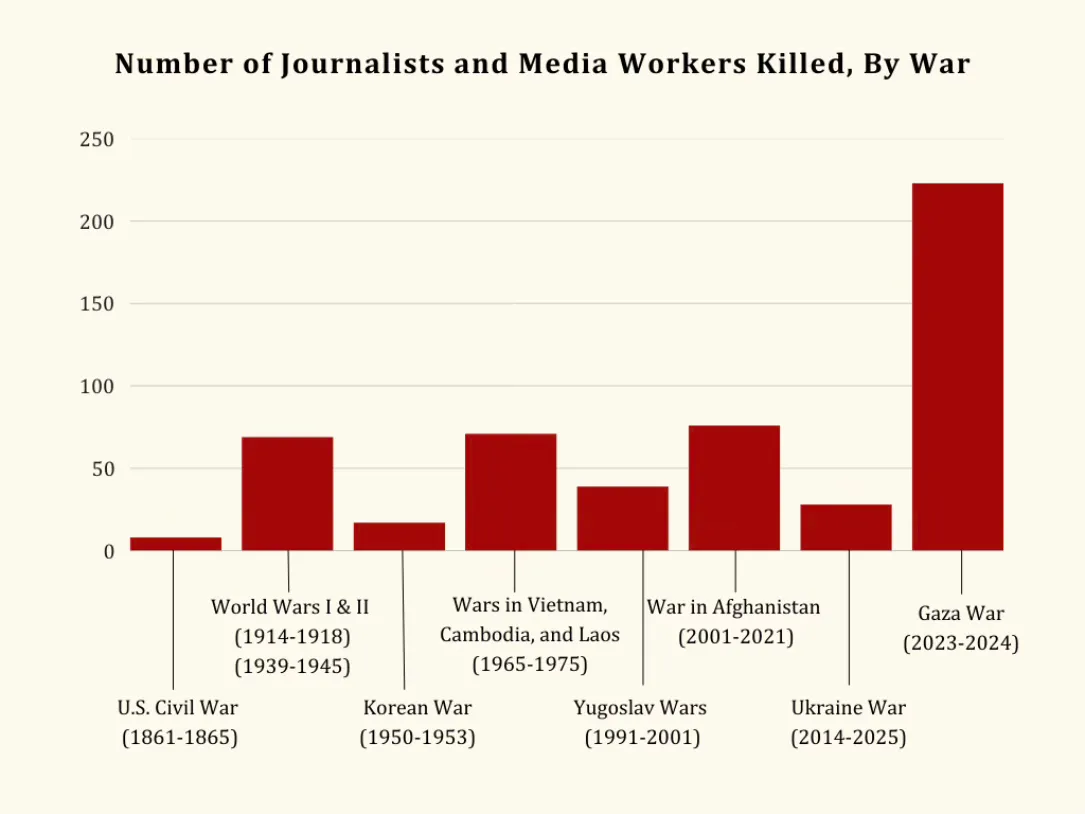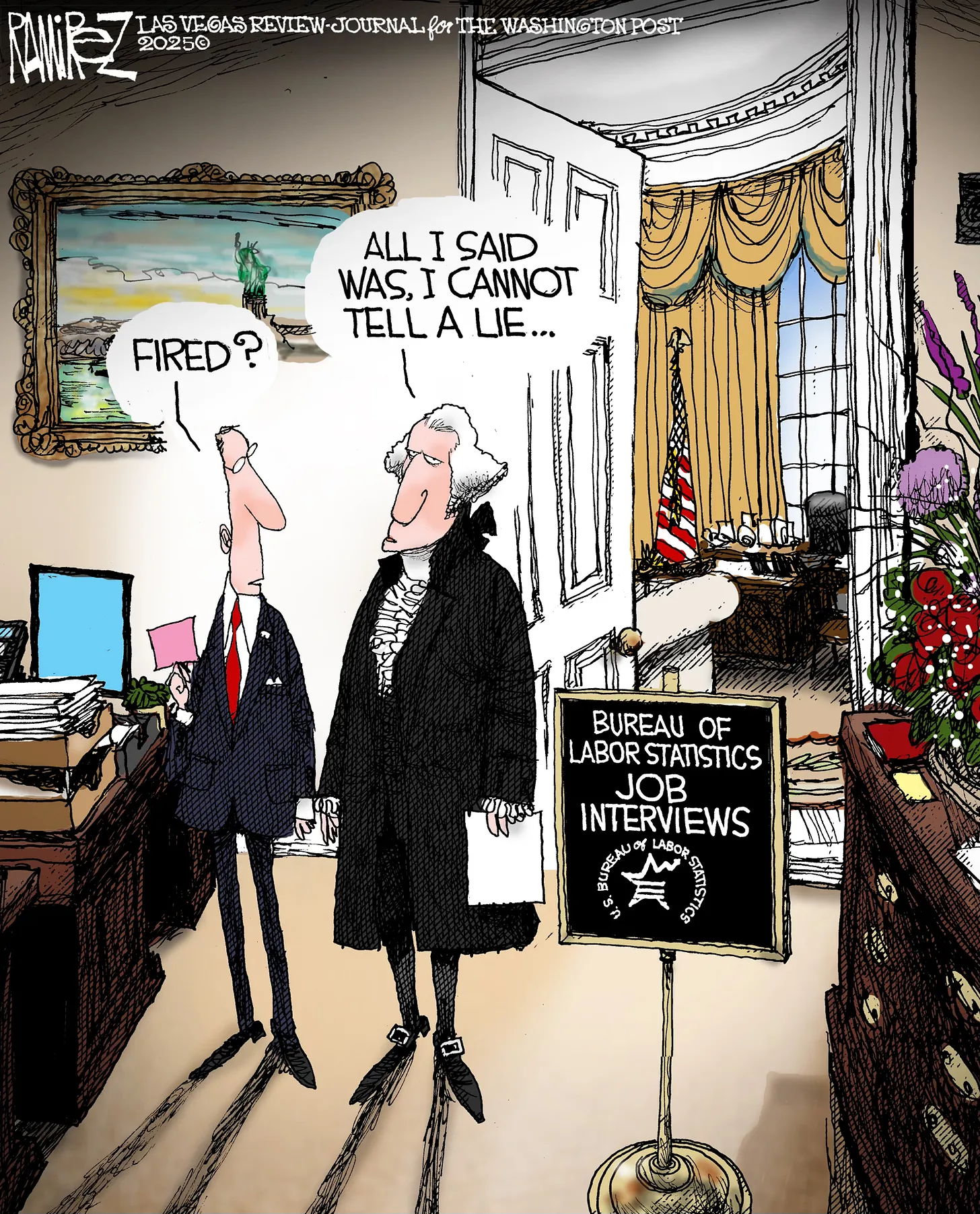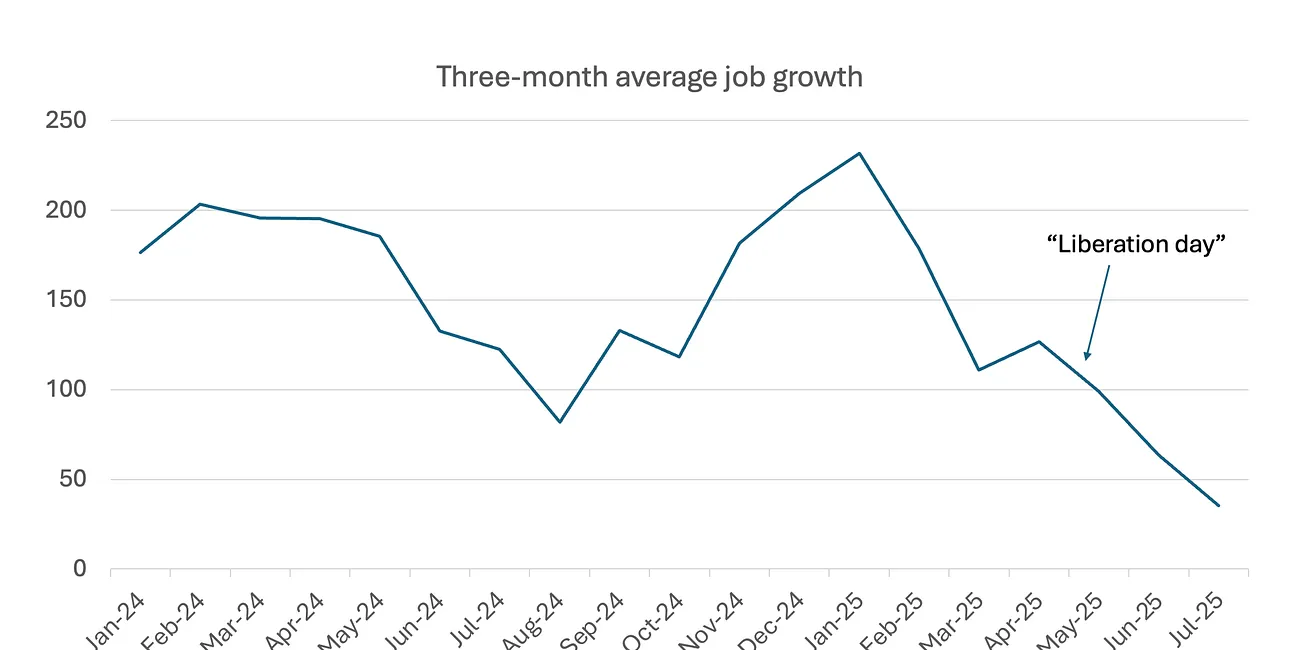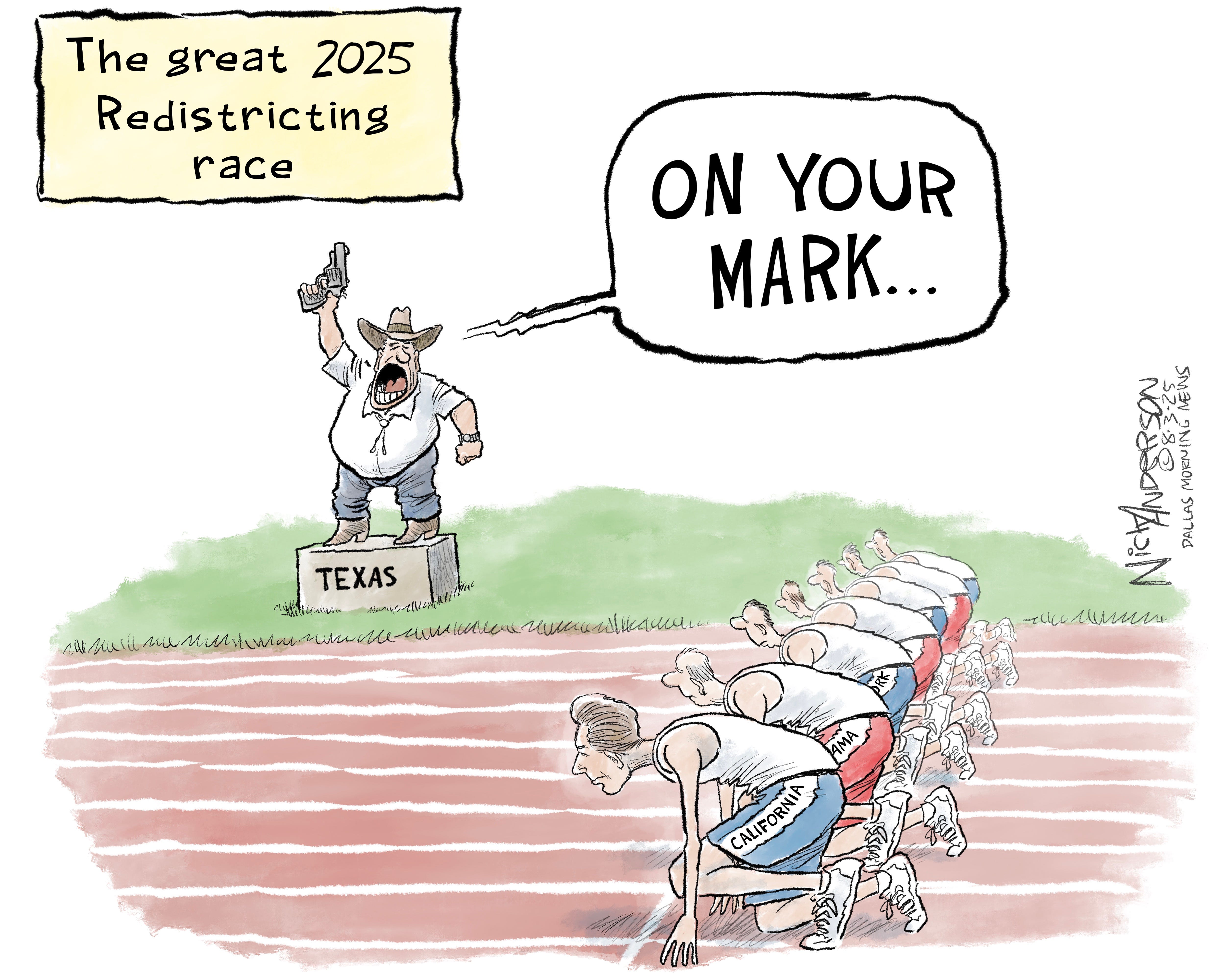Tyrannies don’t always get their way by establishing a secret police force that arrests people at will — although we’re getting that too. Much of their power comes not from overt violence but from their ability to threaten people’s careers and livelihoods, up to and including trumped-up accusations of criminal behavior.
This week's featured post is "Policies to Make the Planet Hotter".
Ongoing stories
As I explained last week, the really important stories are developing on scales longer than a week and wider than any single incident. It's important not to lose sight of them, even as we pay attention to the news that is genuinely "new" this week. Here are the ones I'm keeping my eye on.
- Trump's assault on American democracy. Law enforcement targeted a Trump critic, as well as a Fed governor Trump wants to get out of the way. (Details below.) Trump called for ABC and NBC to lose their licenses for "unfair coverage of Republicans". The gerrymandering war Trump declared is on: Texas fired the first shot and California is trying to respond.
- Climate change. The featured post pulls together a lot of individual stories about the Trump administration actively working to make climate change worse.
- Gaza. Israel prepared for its assault on Gaza City with a bombing campaign, which hit a major hospital and killed a number of journalists, including Americans. Also, an international group officially declared a famine in Gaza.
- Ukraine. The big thing to know about the Ukraine War this week is that, for all the media attention it got, Trump's summit with Putin accomplished nothing. Putin offered no concessions, Trump backed down from putting any real pressure on him, and the war continues apace.
- Epstein. To me, this is more of a political story than a news story. Epstein's crimes, horrible as they were, happened years ago, and Epstein himself is dead. His primary accomplice is in jail, and though there may be others who played a role, that's a crime story, which I typically don't cover. But the administration continues to respond to the controversy as if Trump himself had something to hide, and his base is beginning to doubt him in a way they never did before. One good point that the media hoopla consistently ignores: Yes, we'd know more if the Justice Department released its files, but the victims willing to tell their stories are getting surprisingly little attention. This week's development: DoJ has begun to trickle out the documents it feels safe releasing, including the transcript of Deputy AG Todd Blanche's interview with Ghislaine Maxwell.
This week's developments
The redistricting wars
Texas passed its plan to gerrymander five more Republican House seats.
California responded by sending a ballot question to the voters this November: If it passes, California will gerrymander those five seats back.
If the Democrats had been willing to nuke the filibuster a few years ago, they could have passed a federal law that made gerrymandering illegal.
The raid on John Bolton's house

Friday, the FBI raided John Bolton's house in Bethesda, Maryland and another location whose relationship to Bolton I'm not certain of. They had a search warrant and the crime they claimed probable cause of was mishandling classified documents. Former FBI agent Asha Rangappa wrote in the NYT that they presumably had to get two search warrants from two different judges, which adds some credibility to the raid.
However. Bolton, who for a time was national security advisor during Trump's first term, has more recently been a major Trump critic. Prior to becoming FBI Director, Kash Patel included Bolton on a list of Deep State operatives in his book Government Gangsters. According to The Guardian
Bolton now joins a growing list of Trump critics from Patel’s roll the administration has targeted with what appear to be retaliatory federal investigations: James Comey, the former FBI director, John Brennan, the former CIA director, Miles Taylor, the ex-homeland security official and Lt Col Alexander Vindman. All five people, investigated in just seven months, were on Patel’s roughly 60-name list.
The statements made by Trump officials just couldn't be more laughable, in view of the fact that Trump himself mishandled classified documents -- a charge that was thrown out by Trump-appointed Judge Aileen Cannon in spite of open-and-shut evidence: The government had negotiated to recover the classified documents Trump was holding, was told they had all been returned, and then found a trove of them at Mar-a-Lago.
In a post on X early Friday, Patel wrote, "NO ONE is above the law… @FBI agents on mission." Attorney General Pam Bondi and FBI Deputy Director Dan Bongino also appeared to refer to the search in posts on X. "America’s safety isn’t negotiable. Justice will be pursued. Always," Bondi wrote early Friday. “Public corruption will not be tolerated,” Bongino wrote.
But of course, Trump himself is above the law, now that he controls law enforcement and has the blessing of our partisan Supreme Court. Justice will not be pursued and public corruption will be tolerated where Trump is concerned.
Trump allies, like the January 6 defendants, are also above the law, and can beat police officers to their hearts' content.
The other major case of weaponized law enforcement is Lisa Cook, a member of the Federal Reserve's board. Trump wants Cook gone so that he can appoint her replacement and get closer to complete control of the financial system. (In addition to the policy implications, the possibilities for personal profit are enormous. Trump has bought more than $100 million worth of bonds, whose value will increase if the Fed succumbs to his pressure to reduce interest rates.)
In order to get rid of Cook, the head of the Federal Housing Finance Agency has accused her of committing "mortgage fraud" by claiming two properties as her primary residence simultaneously. (This accusation was made by Pulte on social media, and is not an official charge by the FHFA.) Trump is using this accusation to pressure Cook to resign, and has floated it as justification for firing her.
Paul Krugman points out how unusual this is. Even if the charge is true -- a big If, given the lack of any official action and the general unreliability of Trump administration claims -- this is not how such charges are usually handled.
The truth is that even when clear mortgage fraud has taken place, it almost always leads to an out-of-court settlement, with fees paid to the lender, rather than a criminal case. In 2024, only 38 people in America were sentenced for mortgage fraud.
One mortgage fraudster walking around free is Texas Attorney General Ken Paxton, a Trump ally.
This is another case of shameless hypocrisy. Pulte claims that Cook "falsified bank documents and property records to acquire more favorable loan terms". Falsifying business records to get a lower interest rate is what Trump was convicted of in New York.
Paul Krugman draws the conclusion:
The important thing to understand is that we are all Lisa Cook. You may imagine that your legal and financial history is so blameless that there’s no way MAGA can come after you. If you believe that, you’re living in a fantasy world. Criticize them or get in their way, and you will become a target.
and the Intel deal

The US government now owns 10% of Intel. Apparently, Intel had about $8.9 billion coming to it from two government programs:
$5.7 billion in grants previously awarded, but not yet paid, to Intel under the U.S. CHIPS and Science Act and $3.2 billion awarded to the company as part of the Secure Enclave program.
The Trump administration agreed to stop blocking this money in exchange for 10% of the company. Trump predicted that more such deals are coming.
I will make deals like that for our Country all day long. I will also help those companies that make such lucrative deals with the United States States. I love seeing their stock price go up, making the USA RICHER, AND RICHER.
I am reminded of a quote often attributed (perhaps incorrectly) to Mussolini:
Fascism should more properly be called corporatism because it is the merger of state and corporate power.
and DC
The 2000 or so National Guard troops are still there. They just got authorization to carry weapons. So far they haven't killed anybody. Yesterday Trump threatened to send troops to Baltimore as well.
Like the partial nationalization of Intel I mentioned above, this whole endeavor flies in the face of generations of conservative rhetoric. Remember when Ronald Reagan said this:
The nine most terrifying words in the English language are: "I'm from the Government, and I'm here to help."
The DC intervention is exactly the kind of federal overreach conservatives railed against for decades: The federal government decides it knows best, tells you what your problem is, and then imposes some heavy-handed solution without consulting anybody locally.
The reason this is acceptable in today's GOP is that Republicans have been dehumanizing inner-city people for a long time, especially if they're not White. It's basically a colonial attitude: It would be terrible if the government started imposing its will on ME. But THOSE PEOPLE aren't capable of making decisions for themselves. They may have elected officials to represent them, but they're not advanced enough for democracy.
and that Third Way memo
Third Way, an organization whose basic premise is that Democrats and Republicans are more-or-less equally objectionable to most Americans, sparked a bunch of discussion with a post "Was It Something I Said?". The post listed words that "Democrats and their allies" should avoid using, because they "alienate the many" by sounding "superior, haughty and arrogant".
Language policing is tricky. I already avoid a few of Third Way's taboo words and phrases for a variety of reasons. I don't use Latinx, for example, because personally I've never heard someone of Latin ethnicity use it, and I've heard a few object: The x ending isn't a traditional part of Spanish or Portuguese, and those languages aren't mine to fix.
But policing language can also be a way to police ideas. That was a key "feature" of Newspeak in 1984: If you used Newspeak properly, anti-IngSoc ideas became inexpressible and perhaps even unthinkable.
Jamelle Bouie thinks that's what's going on here:
i think that the issue isn’t the words, it is the substantive positions. no amount of language self policing will satisfy someone who just disagrees with, say, legal protection from gender discrimination
I'll elaborate on that point. Some of the words and phrases Third Way wants us to stop using are privilege, cultural appropriation, systems of oppression, barriers to participation, intersectionality, and patriarchy. The post makes no suggestions about how to acceptably raise the notion that American society is rigged to make success harder for some people than others, or that this rigging runs deeper than just individual prejudices. I suspect Third Way wants such ideas to be inexpressible.
We're also not supposed to use existential threat to describe something like climate change. Or food insecurity to discuss the situation of people who are not hungry (and in fact may take considerable pride in the fact that they fed their children this week), but who aren't sure yet how they're going to afford groceries next week, or in some future week when the boss cuts their hours or the recent cuts to SNAP take effect. And if we can't use subverting norms, how are we supposed to talk about all the actions Trump has taken that are not precisely illegal, but that until now have been off the table because they undermine small-d democracy, another forbidden term?
Until I hear some coherent response to these objections, I will regard the Third Way post as doubleplusungood.
Lindsay Cormack of DCInbox Insights has another objection to the Third Way memo: Who exactly was supposed to be using these terms? She did word counts on over 200K official congressional e-newsletters since 2010 and came to this conclusion:
Looking at actual usage, the Third Way memo reads less like an audit of Democrats’ language and more like a list of terms Republicans tell us Democrats are saying. The data show that many of these phrases barely exist in constituent communications, and when they do, Republicans are often the ones writing them either to lampoon Democrats or to spotlight them as proof of “wokeness.”
... People and politicians should be willing to adapt words when they don’t land and should be open to trying out new terms that capture novel experiences/problems that we need to deal with. But as long as Republicans can keep defining Democrats by terms Democrats themselves rarely use, and everyone comes to believe this through repetition is a much bigger challenge for the impressions of the Democratic Party than any lefty words they might on occasion.
This matches my impression of the 2024 campaign. I don't know how many people have told me that it was a mistake for Democrats to "focus on" transgender issues. But when I ask for an example of the Harris campaign or any other Democratic campaign focusing on transgender issues, I get no answers.
In fact it was Trump who spent a great deal of money focusing on transgender issues and making sure everyone knew Harris supported trans rights. So the real point people are making is that Democrats should throw trans people under the bus, not that we should stop talking about them.
and let's close with something
I've closed with this before, but it bears repeating. The Mitchell Trio, including a very young John Denver, sings a song we may need our own version of in a few years: The I-Was-Not-a-Nazi Polka.















